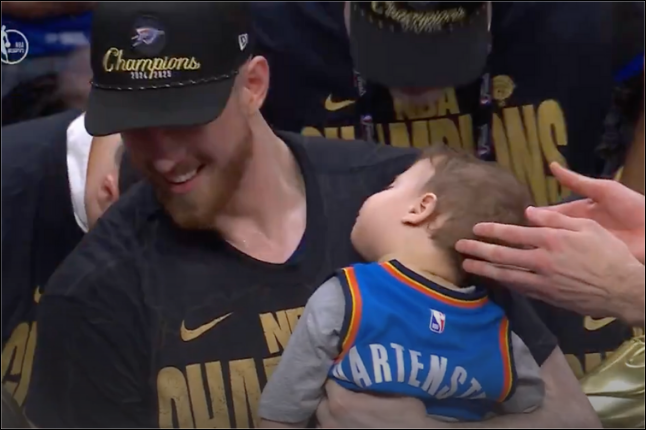
I’ve been writing and illustrating flipbooks. My favorite one is Skirting — go read that if you haven’t already. Now that I’m done with skirts, I’m working on fruit. But I’m constantly worried that this is a just distraction from doing something I’m already good at. Read more

I had to retrain my brain to be a parent. It took a decade because I was going through the five stages of grief. For me, the longest stage was denial, because as long as I kept working full time I didn’t have to deal with the reality of my new life. Read more
It looked like a touching moment. Isaiah Hartenstein, fresh off an NBA championship win, carried his sleeping infant onto the podium to celebrate. Cameras panned. Fans cheered. But the sound levels on that stage were louder than a jet engine—reaching 120 to 130 decibels. That’s the threshold where irreversible hearing damage can happen in seconds. And millions of people watched, thinking this was what fatherhood should look like.
On top of that, Hartenstein held his infant with one hand around the middle while gesturing wildly with the other—a position that left the baby’s head and neck completely unsupported. Even teammates reminded him to support the baby’s head, but Hartenstein ignored the advice entirely. Read more

No Artificial Coke (2016) by Clara Hallencreutz
The Poem of the Day was Having a Fight with You. I click.
is like being burned up
in a twelfth-floor elevator.
Or drowned in a flipped SUV
My heart starts to race. I know those feelings—of not being able to breathe, not being able to move. In the corner of my bedroom on the floor while my mom stood over me, hitting me. Or trapped and naked on my dad’s lap while his hand spanked and slapped. Read more

For the past 30 days, millions of people have watched the Karen Read trial live. I tuned in three weeks ago on a whim. At this point, I’m relieved the closing arguments are tomorrow because I’ve even changed the dog-walk schedule to accommodate voire dire.
At first, I kept watching because I could imagine myself as Karen Read.
She was a financial analyst and former professor dating a cop named John O’Keefe in Canton, an insular Boston suburb full of peopple in law enforcement. Karen’s in her forties with no kids, and she loved John’s kids. If I squint, I can see that being my life. Especially the part about how she didn’t know the townies disliked her. Read more
Camouflaging is what women do to make sure no one thinks we’re weird. This means we end up camouflaging at work and being too exhausted to do it at home. But home is where we really need it, because the effect of camouflaging is to be more agreeable t0 other people. And the workplace doesn’t reward agreeableness.
We intuitively camouflage when dating; don’t do a bait-and-switch.
Once the kids were gone, I found myself choosing bras more carefully. I only have one real bra. The rest are running bras that squoosh. But I started wearing my real bra when Nino came over for dinner. We had not spent a whole dinner alone in 20 years. I wanted to look like someone he might like, so I put on makeup, but not enough for him to be able to tell that I put on makeup just for him.
It took about four dinners before it felt like before we had kids, when everything was fun if we did it together. When he met me I never wore bras – only bathing suit tops. So I quit the bra. And the makeup. Read more

My oldest kid is looking for internships.
For those of you who have not had a kid call you hysterical because their life is over, let me tell you that all the good summer internships are given away in June of the summer before. Read more

From the series Emotional Kintsugi by Glen Martin Taylor
Ever since I read Emily Oster’s first book, I’ve tried to ignore her, but her bestselling books just kept coming. I found solace reading complaints about her sloppy analysis. And I took the MacArthur Foundation to be delivering a secret message when they gave her husband, Jesse Shapiro, a genius grant for describing misinformation in mainstream media.
But I can’t hold back anymore.

The most shocking part of Sean Combs’ trial has been how many people were unmoved by the sight of domestic violence. Over and over again, we hear testimonies of people who watched Combs beat up Cassie Ventura and said nothing. Here’s the problem: what could they say? Given a horrific video of Combs beating her up and his lawyers not even denying he’s a violent abuser, how can anyone take action in the face of domestic violence? What is a person really able to do? Read more

Before there were charge cards, before there were dual-career families, there was second-grade me, shopping after school. “Charge it, please,” I’d say, like a suburban Eloise.
I shopped because there was nothing to do at home after school except fighting with my brother. And every time one of us got hurt, we’d get in trouble for calling our parents at work. The fighting got worse as we got older, and we began to understand: not even blood would get their attention. So we ignored each other, which felt worse than fighting, so I didn’t go home after school. Read more


